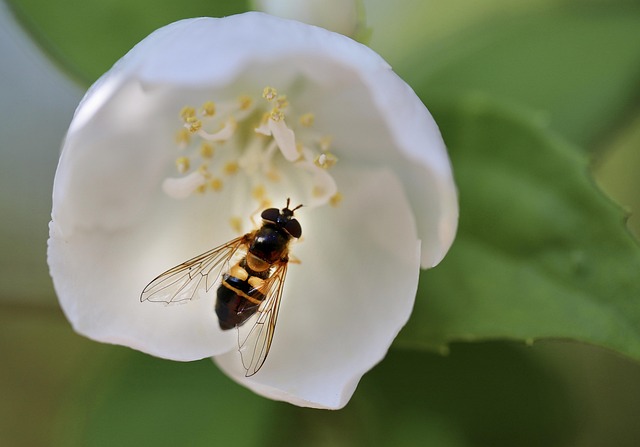Fly infestations significantly impact residential and commercial spaces, prompting the need for fly control services. Effective strategies involve identifying entry points, maintaining cleanliness, and implementing tailored solutions like sealing entrances, targeted treatments, sanitation improvements, trap placement, and biological controls. Professional pest control offers comprehensive plans through meticulous inspections, addressing fly types, life cycles, and breeding grounds. Ongoing management, including regular inspections and targeted treatments, is crucial for sustained pest-free environments, with active participation from homeowners and commercial property managers.
“Flys, whether they’re house flies or fruit flies, can transform from minor nuisances into full-blown infestations. For residential and commercial properties alike, customized fly control plans offer an effective solution. This article delves into the intricacies of fly infestations, exploring common types and entry points. We’ll highlight the benefits of tailored fly control programs and detail how to develop a comprehensive plan through thorough inspection and assessment. Furthermore, we’ll provide essential strategies for successful implementation and ongoing management, empowering you to take charge with professional-grade fly control services.”
Understanding Fly Infestations: Common Types and Entry Points
Fly infestations can be a significant nuisance for both residential and commercial properties, impacting cleanliness and causing discomfort. Understanding these pests is crucial when it comes to effective fly control services. Common types include house flies, fruit flies, and phorid flies, each with unique behaviors and entry points. House flies, the most ubiquitous, are often drawn to food waste and damp environments, entering through open doors or windows. Fruit flies, as their name suggests, prefer decaying organic matter and can be attracted by overripe fruits and vegetables, commonly gaining access via kitchen areas. Phorid flies, meanwhile, are attracted to moist, decomposing materials and may enter through plumbing vents or tiny cracks in walls.
Identifying these entry points is vital for implementing tailored fly control plans. Professional pest control services employ various strategies, from sealing off entrances to using targeted treatments, to ensure long-term prevention and eradication. Regular maintenance and cleanliness practices also play a significant role in mitigating the risk of future infestations.
Benefits of Customized Fly Control Programs
Customized fly control programs offer a multitude of benefits for both residential and commercial properties. Firstly, they ensure tailored solutions that address specific fly issues unique to each location. This precision approach prevents the overuse of pesticides, promoting environmental safety and contributing to a healthier ecosystem. By understanding the habits and habitats of fly species, these programs employ targeted methods like sanitation improvements, trap placement, and biological controls, which are more effective and sustainable than generic treatments.
Moreover, customized plans enhance property aesthetics and value. Commercial spaces can maintain a clean, professional image by reducing fly populations, while residential properties enjoy improved living environments free from the nuisance of flies. These programs also help businesses comply with health and safety regulations, avoiding potential fines and legal issues. Effective fly control services thus provide long-term savings, increased customer satisfaction, and a better reputation for both homeowners and commercial entities.
Developing a Comprehensive Plan: Inspection and Assessment Techniques
Developing a comprehensive fly control plan starts with meticulous inspection and assessment techniques employed by professional fly control services. Experts meticulously examine properties, identifying sources of fly infestations, their behavior patterns, and potential breeding grounds. This involves scrutinizing areas like garbage bins, compost piles, construction sites, or water sources, which often attract flies. By understanding the unique challenges each property presents, tailored strategies can be devised to effectively manage and eliminate fly populations.
During the assessment, professionals consider factors such as the type of flies present, their life cycle, and the specific conditions that facilitate their proliferation. This knowledge enables them to recommend targeted solutions, including improved sanitation practices, structural modifications, and the implementation of appropriate control measures. These assessments are crucial in developing effective, sustainable fly control plans for both residential and commercial settings.
Implementation and Ongoing Management: Effective Strategies for Success
Implementing a customized fly control plan is just the first step; ongoing management is crucial for success in maintaining a pest-free environment. Regular inspections are essential to identify any new entry points or signs of infestation. Professional fly control services often employ a combination of strategies, including sealing off access points, implementing traps, and treating affected areas with targeted pesticides.
For residential properties, homeowners can play an active role by keeping their spaces clean and free of food waste, ensuring proper garbage disposal, and promptly addressing any visible signs of flies. Commercial properties should focus on maintaining high hygiene standards, regular cleaning routines, and efficient waste management systems. Ongoing collaboration between property owners/managers and pest control experts ensures that any issues are swiftly addressed, preventing fly populations from regaining a foothold.
Customized fly control plans offer a comprehensive solution for both residential and commercial properties plagued by fly infestations. By understanding the unique entry points and behaviors of various fly types, professionals can develop targeted strategies that disrupt breeding cycles and prevent re-infestations. Investing in these tailored programs not only provides immediate relief but also ensures long-term protection, contributing to a healthier and more comfortable living or working environment. Effective fly control services thus serve as a powerful tool for property managers and homeowners alike, enhancing the overall quality of life and minimizing the risks associated with persistent fly problems.
